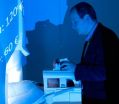(Press-News.org) This news release is available in German.
FRANKFURT. WaterGAP (Water Global Assessment and Prognosis) is a hydrological model used to model water shortage, groundwater depletion, and floods and droughts (e.g. as impacted by climate change) over the land area of the globe. The Frankfurt hydrologist Prof. Petra Döll has examined how good a fit this model provides, using GPS observations and data from the GRACE satellite, which measures the gravitational field of the Earth. The study, published in the current issue of the scientific journal Surveys in Geophysics indicates that WaterGAP needs to be modified.
"In most regions of the globe, WaterGAP underestimates seasonal continental water storage fluctuations and does not retain rainwater for a sufficiently long time on the continents", is how Petra Döll from the Institute of Physical Geography at Goethe University sums up the findings. "So more water is being stored than the model predicts."
On a daily basis and with a spatial resolution of approx. 50 km, WaterGAP measures various forms of water flux such as evaporation, groundwater recharge and water flow in rivers, as well as the amount of water stored in the ground, in groundwater, in surface water bodies and as snow. Here, water abstraction for drinking water, industry and agriculture is also taken into account. A variety of data is used in calculating the models: climatic data, data concerning vegetation and soil, as well as socioeconomic and many other data besides.
Due to the uncertain data that is fed in and the simplifications required in a global-scale model, the findings are unreliable. Until now, river flow data has been employed to calibrate and check the quality of the model, but unfortunately this data does not exist for all major rivers. Besides, a model also needs to accurately map the dynamics of the stored water in order, for example, to be able to detect water abstraction by humans.
For this reason, to check the model, Petra Döll decided to use the influence of water masses on the deformation of the Earth's crust and the gravitational field of the Earth. Periodic changes in water masses deform the Earth's crust, which causes the position of permanently installed GPS antennae to vary by millimetres. Simultaneously, varying water masses also lead to significant variations in the Earth's gravitational field. These can be estimated using the GRACE satellite.
Working together with Dr. Mathias Fritsche, a geodesist in Dresden specialising in the data analysis of GPS observations, and Dr. Annette Eicker, a geodesist in Bonn dealing with gravity field computation, Petra Döll checked the WaterGAP calculations for the dynamic of continental water storage and could thus identify the shortcomings of the model.
In the study, the changes in position of about 200 GPS worldwide-distributed antennae were measured and compared to the changes in position that should – according to the WaterGAP calculations – have occurred due to the variations in water masses. In addition the researchers compared the seasonal variations of the continental component of GRACE gravitational fields to the results from WaterGAP. The result showed that WaterGAP underestimates seasonal variations in continental water storage and so in the future it will need to be modified.
A further result of the study is that seasonal variations in the Earth's gravitational field cannot be used to measure human water abstraction. The reason for this is that there are too few permanently installed GPS antennae, and the accuracy and spatial resolution of GRACE's field of gravity is too poor. "Only if water abstraction leads to groundwater depletion, i.e. where the amount of water abstracted is greater than the inflow, can GRACE satellite measurements be used to support the quantification of water abstraction", explains Prof. Döll. This possibility was used in a follow-up study, which has not yet been published.
INFORMATION:
The research work was funded by the German Research Foundation as part of its priority programme "Mass transport and mass distribution in the system Earth".
Publications: Döll, P., Fritsche, M., Eicker, A., Müller Schmied, H. (2014): Seasonal water storage variations as impacted by water abstractions: Comparing the output of a global hydrological model with GRACE and GPS observations. Surv Geophys. DOI 10.1007/s10712-014-9282-2
An image can be downloaded under: http://www.muk.uni-frankfurt.de/49933909/064_Pressetext-Doell.pdf
Picture text: The map shows where the WaterGAP model needs to be improved. Red dots mark the location of permanent GPS antennae that indicate that WaterGAP underestimates seasonal water storage. Red areas show where the programme underestimates the amount of water compared to the gravitational field of the Earth, as measured by the GRACE satellite. Within the masked areas, the signal from GRACE is of low significance.
Information: Prof. Petra Döll, Institute of Physical Geography, Tel.: +49-69-798-40219, p.doell@em.uni-frankfurt.de
GPS also helps to analyze global water resources
Hydrological model WaterGAP needs to be modified
2014-03-19
ELSE PRESS RELEASES FROM THIS DATE:
Rewrite the textbooks on water's surface tension
2014-03-19
Researchers from the University of Melbourne and University of Sydney are confident their new reaserach results will make significant differences to the calculations of surface tension of water used by the next generation of atmospheric scientists, biophysicists and engineers of technology like inkjet printers.
These latest investigations have clinched a long-standing controversy amongst the physical Chemistry community; the air-water interface is negatively charged by the adsorption of hydroxide ions.
Prof Angus Gray-Weale from the Chemistry, Department of Chemistry ...
Ottawa researchers find new pathway connected to type 2 diabetes
2014-03-19
Ottawa, ON, March 19, 2014 — Scientists at the Children's Hospital of Eastern Ontario (CHEO) Research Institute have discovered a cellular pathway that is responsible for keeping blood sugar levels low in obese or pre-diabetic people, and may prevent the onset of Type 2 diabetes. The discovery published this month in a leading journal Nature Cell Biology.
Following a meal, beta cells found in islets of the pancreas secrete insulin that helps to store food energy for future use. The inability of islet beta cells to produce enough insulin leads to diabetes. Unlike other ...
Postoperative cognitive dysfunction
2014-03-19
Older persons, in particular, tend to suffer from memory lapses and other types of cognitive impairment after undergoing surgical procedures (postoperative cognitive dysfunction, POCD). Surgery has been performed on older patients much more commonly in recent years than ever before, and their pre- and postoperative care has become an important matter. Ingrid Rundshagen, an anesthesiologist, has surveyed the available literature to find out what kinds of patients are more likely to have cognitive impairment after surgery, and how the clinical manifestations should best be ...
Diversity in UK gardens aiding fight to save threatened bumblebees, study suggests
2014-03-19
The global diversity of plants being cultivated by Britain's gardeners is playing a key role in the fight to save the nation's threatened bumblebees, new research has revealed.
Ecologists at Plymouth University, in a study published this week, have shown the most common species of bumblebee are not fussy about a plant's origin when searching for nectar and pollen among the nation's urban gardens.
But other species – and, in particular, long-tongued bees – do concentrate their feeding upon plants from the UK and Europe, for which they have developed a preference evolved ...
EU could afford to lead international climate action
2014-03-19
Major emitting countries may have to join the EU's effort much earlier to avoid a temporary overshoot of the 2 degree target, but even if they joined only in 2030, the overshoot would be limited to roughly 0.2 to 0.4 degrees Celsius. The initial unilateral leadership could be achieved at little extra costs for the EU. Late-comers would have the benefit of lower costs while they delay action but would face higher transient costs once their turn to decarbonize comes.
"The crisis-stricken EU is asking itself whether it can still afford climate leadership" says lead-author ...
Rush to prescribe: Study questions speed in giving antidepressants to grieving parents
2014-03-19
TALLAHASSEE, Fla. — Some doctors are too quick to prescribe antidepressants to parents who have suffered the death of a child either during pregnancy or within the first month of life, according to a study conducted by Florida State University researcher Jeffrey R. Lacasse.
In a study of 235 bereaved parents participating in an online support community, Lacasse found that 88 — or 37.4 percent — of them were prescribed a psychiatric medication to help them cope. Some women received prescriptions with a week of losing their children.
"This is simply too soon after the ...
Global attack needed to catch credit thieves
2014-03-19
EAST LANSING, Mich. — Stopping massive data breaches like the one that hit Target will require a more sophisticated, collaborative approach by law enforcement agencies around the world, a Michigan State University cyber security expert argues.
In a new research report for the National Institute of Justice, Thomas Holt found many hackers and data thieves are operating in Russia or on websites where users communicate in Russian, making it easier to hide from U.S. and European authorities. All countries need to better work together to fight hacking and data theft campaigns, ...
Pocket diagnosis
2014-03-19
A recently-developed mobile phone application could make monitoring conditions such as diabetes, kidney disease, and urinary tract infections much clearer and easier for both patients and doctors, and could eventually be used to slow or limit the spread of pandemics in the developing world.
The app, developed by researchers at the University of Cambridge, accurately measures colour-based, or colorimetric, tests for use in home, clinical or remote settings, and enables the transmission of medical data from patients directly to health professionals.
Decentralisation ...
Comeback of an abandoned antibiotic
2014-03-19
This news release is available in German. The common bacterium Streptococcus pyogenes is responsible not only for scarlet fever, a childhood disease presenting with characteristic skin rash, but also for many suppurative infections of the skin. The infection can be associated with serious consequences such as acute rheumatic fever and inflammation of the kidneys. In Germany, physicians usually prescribe penicillin, an antibiotic. In less-developed countries, penicillin is not always an option though. Firstly, penicillin is often not available and secondly, co-infections, ...
A majority prefers letting computers decide
2014-03-19
When individuals engage in risky business transactions with each other, they may end up being disappointed. This is why they'd rather leave the decision on how to divvy up jointly-owned monies to a computer than to their business partner. This subconscious strategy seems to help them avoid the negative emotions associated with any breaches of trust. This is the result of a study by scientists from the University of Bonn and US peers. They are presenting their findings in the scientific journal "Proceedings of the Royal Society B."
Trust is an essential basis for business ...
LAST 30 PRESS RELEASES:
Nanoplastics can interact with Salmonella to affect food safety, study shows
Eric Moore, M.D., elected to Mayo Clinic Board of Trustees
NYU named “research powerhouse” in new analysis
New polymer materials may offer breakthrough solution for hard-to-remove PFAS in water
Biochar can either curb or boost greenhouse gas emissions depending on soil conditions, new study finds
Nanobiochar emerges as a next generation solution for cleaner water, healthier soils, and resilient ecosystems
Study finds more parents saying ‘No’ to vitamin K, putting babies’ brains at risk
Scientists develop new gut health measure that tracks disease
Rice gene discovery could cut fertiliser use while protecting yields
Jumping ‘DNA parasites’ linked to early stages of tumour formation
Ultra-sensitive CAR T cells provide potential strategy to treat solid tumors
Early Neanderthal-Human interbreeding was strongly sex biased
North American bird declines are widespread and accelerating in agricultural hotspots
Researchers recommend strategies for improved genetic privacy legislation
How birds achieve sweet success
More sensitive cell therapy may be a HIT against solid cancers
Scientists map how aging reshapes cells across the entire mammalian body
Hotspots of accelerated bird decline linked to agricultural activity
How ancient attraction shaped the human genome
NJIT faculty named Senior Members of the National Academy of Inventors
App aids substance use recovery in vulnerable populations
College students nationwide received lifesaving education on sudden cardiac death
Oak Ridge National Laboratory launches the Next-Generation Data Centers Institute
Improved short-term sea level change predictions with better AI training
UAlbany researchers develop new laser technique to test mRNA-based therapeutics
New water-treatment system removes nitrogen, phosphorus from farm tile drainage
Major Canadian study finds strong link between cannabis, anxiety and depression
New discovery of younger Ediacaran biota
Lymphovenous bypass: Potential surgical treatment for Alzheimer's disease?
When safety starts with a text message
[Press-News.org] GPS also helps to analyze global water resourcesHydrological model WaterGAP needs to be modified





